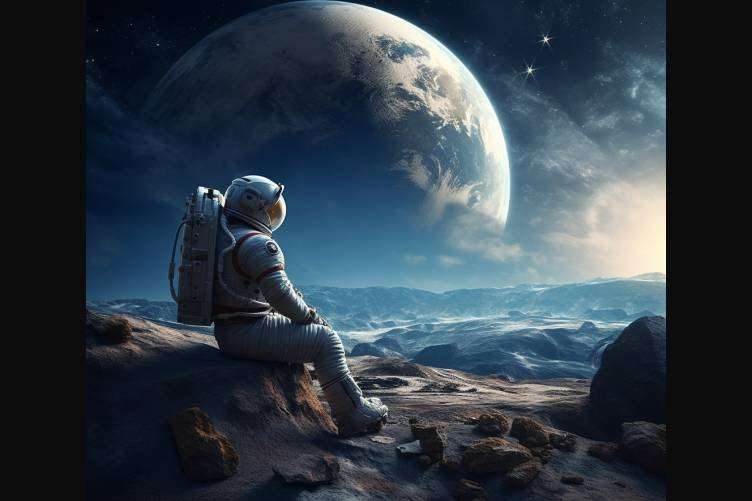The Indian Space Research Organisation (ISRO) is making significant strides in its mission to send the first Indian astronaut to the Moon by 2040. Building upon the success of the Chandrayaan-3 lunar mission, ISRO Chief S Somanath recently announced that four test pilots from the Indian Air Force have been selected as Astronaut-Designates for this historic endeavor.
The Gaganyaan Mission, as it is called, is set to launch a crew of two to three Indian astronauts into Low Earth Orbit (LEO) for a duration of up to three days. After completing their mission, the astronauts will be safely returned to a predefined site in Indian waters. This ambitious project is a testament to India’s growing capabilities in space exploration and its commitment to pushing boundaries.
As part of the preparation for the manned mission, the selected astronauts are currently undergoing rigorous training at the Astronaut Training Facility (ATF) in Bengaluru. This state-of-the-art facility is equipped with advanced simulators and training modules to simulate various aspects of space travel, including microgravity conditions, emergency procedures, and spacecraft operations. The training program aims to prepare the astronauts physically, mentally, and technically for the challenges they will face during their mission.
Prior to the manned mission, ISRO plans to conduct two unmanned missions (G1 and G2) to gather valuable data and test the systems and technologies necessary for a successful human spaceflight. These unmanned missions will serve as crucial stepping stones towards the ultimate goal of sending Indian astronauts to the Moon.
In addition to the Moon mission, ISRO has set its sights on other ambitious space projects. One such project is the Aditya L1 mission, which aims to study the Sun from a unique vantage point called the Sun-Earth Lagrange Point 1 (L1). The spacecraft will be placed in a Halo orbit around L1, allowing it to observe the Sun continuously without any interruptions from Earth’s shadow. This mission will provide valuable insights into the Sun’s behavior and help scientists better understand solar phenomena.
ISRO is also working towards launching a Venus Orbiter Mission, which will study the atmosphere, surface, and other characteristics of Venus. This mission will contribute to our understanding of the processes that have shaped Venus and provide valuable data for future exploration of the planet.
Furthermore, ISRO is actively developing a Mars Lander, building upon the success of the Mars Orbiter Mission (MOM) in 2014. The Mars Lander will be designed to land on the Martian surface and carry out scientific experiments to study the planet’s geology, atmosphere, and potential for supporting life.
The ambitious goals set by ISRO reflect India’s determination to establish itself as a major player in space exploration. With each successful mission, ISRO is pushing the boundaries of what is possible and inspiring future generations of scientists and engineers.



вывод. из. запоя. на. дому. ростов. [url=https://www.vyvod-iz-zapoya-rostov16.ru]вывод. из. запоя. на. дому. ростов.[/url] .
вывод. из. запоя. анонимно. ростов. [url=www.vyvod-iz-zapoya-rostov15.ru/]вывод. из. запоя. анонимно. ростов.[/url] .
вывод из запоя цены ростов-на-дону http://www.vyvod-iz-zapoya-rostov15.ru .
вывод из запоя цена ростов вывод из запоя цена ростов .
вывод из запоя на дому в ростове [url=https://vyvod-iz-zapoya-rostov17.ru]вывод из запоя на дому в ростове[/url] .
вывод из запоя в стационаре ростов-на-дону вывод из запоя в стационаре ростов-на-дону .
нарколог на дом анонимно [url=https://www.narkolog-na-dom-krasnodar17.ru]https://www.narkolog-na-dom-krasnodar17.ru[/url] .
вызов нарколога на дом круглосуточно [url=http://narkolog-na-dom-krasnodar16.ru/]http://narkolog-na-dom-krasnodar16.ru/[/url] .
вызов нарколога цена вызов нарколога цена .
нарколог краснодар нарколог краснодар .
Можно ли купить аттестат о среднем образовании? Основные рекомендации
студент купил диплом [url=https://arusak-diploms.ru/]arusak-diploms.ru[/url] .
магазин франшиз [url=www.franshizy13.ru/]магазин франшиз[/url] .
магазин франшиз магазин франшиз .
Как получить диплом техникума официально и без лишних проблем
где купить диплом в москве где купить диплом в москве .
Как не попасть впросак при покупке диплома колледжа или ПТУ в России
ретроказино [url=https://newretrocasino-casino3.ru]https://newretrocasino-casino3.ru[/url] .
Официальная покупка диплома вуза с сокращенной программой обучения в Москве
fire-team.ru/forum/member.php?u=1143
Быстрое обучение и получение диплома магистра – возможно ли это?
выведение из запоя на дому санкт петербург [url=https://azithromycinum.ru/]выведение из запоя на дому санкт петербург[/url] .
вывод из запоя цены azithromycinum.ru .
вывод из запоя на дому санкт петербург [url=www.vyvod-iz-zapoya-v-sankt-peterburge16.ru]вывод из запоя на дому санкт петербург [/url] .
вывод из запоя цены санкт-петербург https://vyvod-iz-zapoya-v-sankt-peterburge16.ru .
купить диплом образования красноярск landik-diploms.ru .
купить диплом о повышении квалификации [url=https://arusak-diploms.ru/]купить диплом о повышении квалификации[/url] .
Полезная информация как купить диплом о высшем образовании без рисков
Как приобрести аттестат о среднем образовании в Москве и других городах
ksolo.ru/forum/member.php?u=83595
Как приобрести диплом о среднем образовании в Москве и других городах
kvitka.ukrbb.net/viewtopic.php?f=58&t=27120
Купить диплом о среднем образовании в Москве и любом другом городе
Как купить аттестат 11 класса с официальным упрощенным обучением в Москве
optohit.ru/forum/user/48415
Приобретение школьного аттестата с официальным упрощенным обучением в Москве
промокод prodamus prodamus-promokod21.ru .
Диплом вуза купить официально с упрощенным обучением в Москве
Как приобрести диплом о среднем образовании в Москве и других городах
Как безопасно купить диплом колледжа или ВУЗа в России, что важно знать
Легальные способы покупки диплома о среднем полном образовании
Узнайте стоимость диплома высшего и среднего образования и процесс получения
Как официально приобрести аттестат 11 класса с минимальными затратами времени
Диплом техникума купить официально с упрощенным обучением в Москве
Официальная покупка диплома ВУЗа с упрощенной программой обучения
Парадокс, но купить диплом кандидата наук оказалось не так и сложно